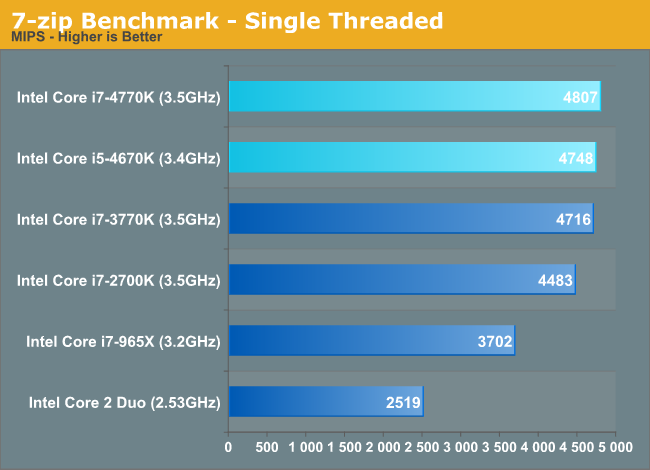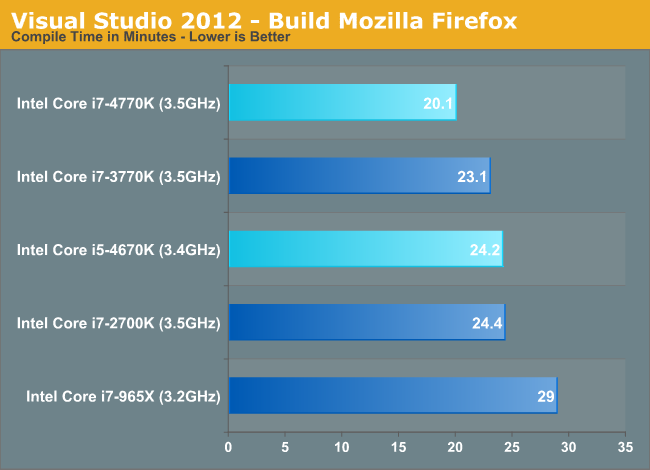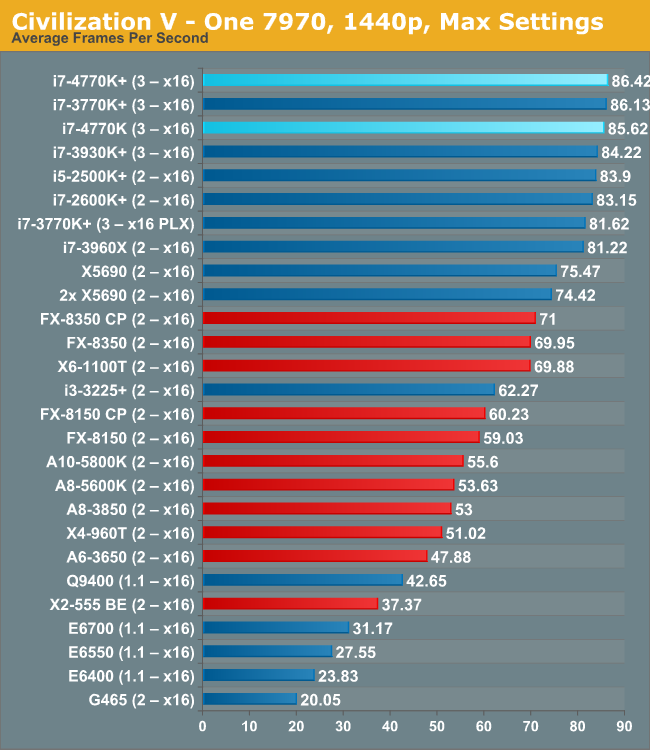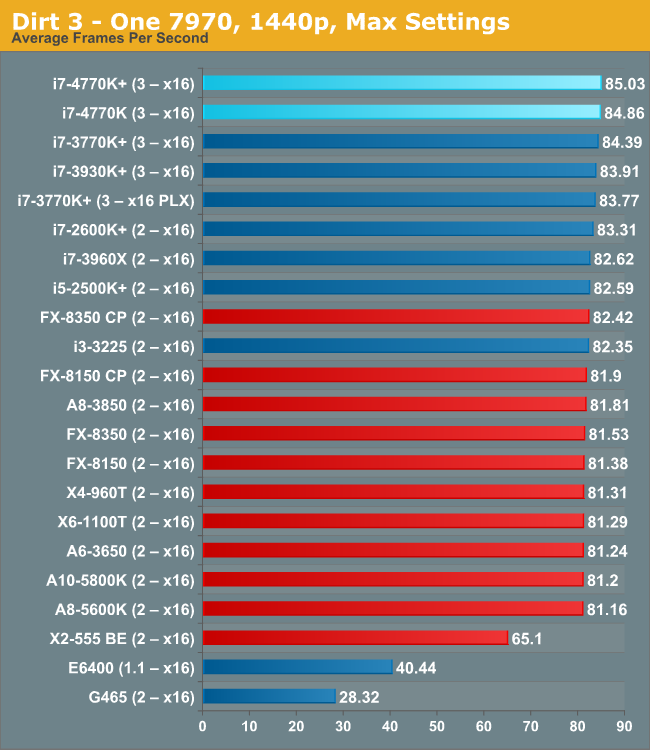The Haswell Review: Intel Core i7-4770K & i5-4670K Tested
by Anand Lal Shimpi on June 1, 2013 10:00 AM ESTCPU Performance: Five Generations of Intel CPUs Compared
For the purposes of our look at Haswell, we will be breaking up our review coverage into two parts. The rest of this article will focus on the CPU side of Haswell, while coverage of the GPU - including Iris Pro and Crystalwell - has been spun off into another artice: Intel Iris Pro 5200 Graphics Review: Core i7-4950HQ Tested.
The majority of the market doesn’t upgrade annually, so I went back a total of five generations to characterize Haswell’s CPU performance. Everything from a 2.53GHz Core 2 Duo through Nehalem, Sandy Bridge, Ivy Bridge and Haswell are represented here. With the exception of the Core 2 platform, everything else is running at or near the peak launch frequency for the chip.
In general, I saw performance gains over Ivy Bridge of 1 - 19%, with an average improvement of 8.3%. Some of the performance gains were actually quite impressive. The 7.8% increase in Kraken shows there’s still room for improvement in lightly threaded performance, while the double digit FP performance gains in POV-Ray and x264 HD really play to Haswell’s strengths.
Compared to Sandy Bridge, Haswell looks even more impressive. The Core i7-4770K outperforms the i7-2700K by 7 - 26%, with an average performance advantage of 17%. The gains over Sandy Bridge aren’t large enough to make upgrading from a Sandy Bridge i7 to a Haswell i5 worthwhile though, as you still give up a lot if you go from 8 to 4 threads on a quad-core part running heavily threaded workloads.
Compared to Nehalem the gains average almost 44%.











Quite possibly the most surprising was just how consistent (and large) the performance improvements were in our Visual Studio 2012 compile test. With a 15% increase in performance vs. Ivy Bridge at the same frequencies, what we’re looking at here is the perfect example of Haswell’s IPC increases manifesting in a real-world benchmark.
Gaming Performance
After spending far too much time on the Iris Pro test system, I didn’t have a ton of time left over to do a lot of gaming performance testing with Haswell. Luckily Ian had his gaming performance test data already in the engine, so I borrowed a couple of graphs.
As expected, Haswell is incrementally quicker in GPU bound gaming scenarios compared to Ivy Bridge - and most definitely at the top of the charts.












210 Comments
View All Comments
winterspan - Monday, June 3, 2013 - link
So, can someone catch me up with why Haswell isn't being compared to the older Core i7-39xx Sandy Bridge chips with 6 cores (Sandy Bridge E series)? Is it because they are based on the Xeon architecture and thus are not directly comparable? Will we see an Haswell-E (or Ivy Bridge E) series-based Core i7 with more than 4 cores as a follow-up to the Core i7-39xx?TomWomack - Monday, June 3, 2013 - link
Yes, Ivy Bridge E should appear in the fall; it's not at present quite clear how many cores it will have, possibly only six with the 8- and 12-core units reserved for sale as Xeons.Asking anandtech.com/bench to compare a 4770K and a 3930X, Haswell wins on single-thread and loses on some multi-thread tests, which is what you'd expect.
Kevin G - Monday, June 3, 2013 - link
Probably because it'd be embarrassed in some cases. For lightly threaded workloads, the i7 4770k would come out on top. The six core i7 39xx chips need heavily threaded applications to really shine. Also of note is that GT3e versions of Haswell have 128 MB of L4 cache which further improves IPC. A hypothetical 3.5 Ghz fully functional Haswell with GT3e and recompiled software will likely out run an 8 core socket 2011 Xeon.boe - Monday, June 3, 2013 - link
Pretty much a big steaming pile of meh.They should have at least put more PCIe lanes on the thing otherwise it is just last years processor by another name.
milkod2001 - Monday, June 3, 2013 - link
What revision of i7-4770K was tested here? There's been rumors about early Haswell revisions giving some problems to usb3 connected devices. When in sleep mode it can't wake up after that:http://www.tomshardware.com/news/Haswell-USB-3.0-S...
Would love to see some additional tests covering this problems to make sure I won't spend weeks sending faulty CPU back, waiting and all that s..t.
Diogenes5 - Monday, June 3, 2013 - link
TIL that my 2-year-old i2500k still rocks it for the price and the overclock I have it at (beats any current gen processor for most tasks).Oscarcharliezulu - Monday, June 3, 2013 - link
Thx for the review Anand, as always very thoughtful and well written. You always have a good mix of objective and intelligent subjective. Looking forward to Ivy-E now.psuedonymous - Monday, June 3, 2013 - link
Dangit Anand! Why are you still using 2-pass encoding? Everyone and their dog have switched to the faster and more effective CRF. It may have some obscure use as a synthetic benchmark, but it's certainly not a real world one!skrewler2 - Monday, June 3, 2013 - link
Pretty annoying they're still not including VT-d support in their K series.SanX - Monday, June 3, 2013 - link
Anand gets on my nerves lately. Smells like shill articles everything he personally covers.